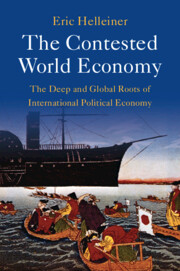Book contents
- The Contested World Economy
- The Contested World Economy
- Copyright page
- Dedication
- Contents
- Preface
- Abbreviations
- 1 Introduction and Overview
- Part I The Three Orthodoxies in a Global Context
- Part II Beyond the Three Orthodoxies
- 8 Autarkic Visions of Economic Self-Sufficiency
- 9 Environmentalist Calls for a More Sustainable Economic Order
- 10 Feminist Critiques of a Patriarchal World Economy
- 11 Pan-African Responses to a Racialized World Economy
- 12 Religious and Civilizational Political Economies of Pan-Islamism and Pan-Asianism
- 13 Distinctive Visions of Economic Regionalism for East Asia, Europe, and the Americas
- Part III Ending at a Beginning
- Works Cited
- Index
13 - Distinctive Visions of Economic Regionalism for East Asia, Europe, and the Americas
from Part II - Beyond the Three Orthodoxies
Published online by Cambridge University Press: 20 April 2023
- The Contested World Economy
- The Contested World Economy
- Copyright page
- Dedication
- Contents
- Preface
- Abbreviations
- 1 Introduction and Overview
- Part I The Three Orthodoxies in a Global Context
- Part II Beyond the Three Orthodoxies
- 8 Autarkic Visions of Economic Self-Sufficiency
- 9 Environmentalist Calls for a More Sustainable Economic Order
- 10 Feminist Critiques of a Patriarchal World Economy
- 11 Pan-African Responses to a Racialized World Economy
- 12 Religious and Civilizational Political Economies of Pan-Islamism and Pan-Asianism
- 13 Distinctive Visions of Economic Regionalism for East Asia, Europe, and the Americas
- Part III Ending at a Beginning
- Works Cited
- Index
Summary
This chapter examines some distinctive ideas about economic regionalism that emerged during the interwar years and the early 1940s. Some arose in the context of Japanese debates about a Greater East Asia Co-Prosperity, of which the most sophisticated was Akamatsu Kaname’s “Wild Geese Flying Pattern theory” of regional economic integration. Others were associated with post-1933 German designs for Europe’s economy, including “Schachtian” managed bilateralism (Hjalmar Schacht), fascist multilateralism (Walter Funk), and visions of a “great-space economy” (Friedrich Zimmermann). The final example comes from Peru’s Víctor Raúl Haya de la Torre who advanced a quite different anti-imperialist vision of regionalism initially through what he called “Indoamerican economic nationalism” within Latin America and then via a wider vision of “democratic Interamericanism without empire” that was inclusive of the United States.
Keywords
- Type
- Chapter
- Information
- The Contested World EconomyThe Deep and Global Roots of International Political Economy, pp. 219 - 236Publisher: Cambridge University PressPrint publication year: 2023

